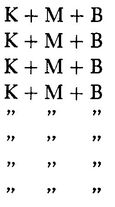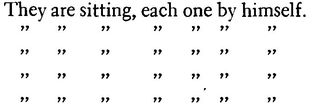The Ride Across Lake Constance and Other Plays (5 page)
Read The Ride Across Lake Constance and Other Plays Online
Authors: Peter Handke
Tags: #Fiction, #Literary

BOOK: The Ride Across Lake Constance and Other Plays
7.76Mb size Format: txt, pdf, ePub
He takes the hose out of the kettle, lets it drop. He puts the cover on the kettle and puts the kettle on the hot plate.
The warden drags the rubber hose onstage.
As the hose is apparently very long, he has to drag for quite a long time. Finally the warden drags the entire hose onstage.
Nothing funny happens.
He winds the hose in an orderly manner over hand and elbow, goes to the table, and places the rolled-up hose with the other objects on the table. He resumes his position.
Quietly, contemplating each other, the two figures squat onstage.
Gradually we begin to hear the water simmering in the kettle.


The ward gets up, fetches the coffee grinder, sits down, makes himself comfortable on the chair, clasps the coffee grinder between his knees and starts to grind. We can hear the grinding â¦




The ward gradually stops grinding â¦
Now the stopper is probably blown off the kettle, so that it becomes quiet again.
The music sets in at the appropriate moment, when the stage once more becomes dark.
On the bright stage we see the two persons at the table, the hot plate having of course been turned off in the meantime.
The warden gets up and goes offstage.
But he returns quite soon, a frying pan with glowing incense in one hand, a big piece of white chalk in the other.
We smell the incense and also see clouds of incense.
The warden goes to the door and starts writing something on the top of the door.
The moment he puts chalk to wood, the ward turns toward him on the chair; the ward reaches into his pants and throws something at the warden ⦠it must be something very light because the warden does not stop his very slow writing, which looks almost like drawing.
The ward makes himself comfortable on his chair and throws again, unhurriedly.
The warden writes; the ward throws.
We see that the ward's projectiles are sticking to the warden's shirt: yes, they are thistles.
While the warden is slowly writing, the ward occasionally throws a thistle at him, yet without expressing anything with the manner in which he throws it.
We hear the music and smell the incense.
The warden's back is slowly but surely covered with a cluster of thistles while he writes.
He writes slowly down along the door:

The ward now takes the thistles out of his fist and throws them with the other hand.
The warden, while writing, takes the bullwhip from the door.
Now he steps back.
The ward happens to be throwing again.
The warden turns around as though accidentally, not quickly; at the same time, the ward throws a thistle, which hits the warden's chest (or not). The warden is standing there by himself; the ward throws the remaining thistles at the warden.
The warden is holding the pan with the incense in front of him. The longer the warden holds the pan, the longer the intervals between the ward's throws.
Meanwhile, it gradually becomes dark once again, and the music ⦠(see above)
Â
The two figures are sitting on the stage, which is bright again; they are sitting at the table, each one by himself.

All at once we notice there is blood running from the ward's nose. The blood trickles out of his nose, across his mouth, over his chin, out of his nose â¦
The warden is sitting there by himself, the ward doesn't budge from the spot, doesn't budge from the spot â¦
Gradually it becomes dark again on the stage.
Â
Once we can see again, both of them are sitting in their positions at the table.
The ward gets up and stands against the rear wall, with his back to us.
The warden gets up, goes to the ward, grabs him by the shoulder, without expressing anything (that is, not violently), and turns him around.
The warden, after a pause, changes the position of his hands and turns the ward around once more.
The turning around gradually turns into turning around and turning around, now into turning around pure and simple.
The warden turns the ward with ease, almost as though he were thinking of something else, and the ward turns easily, also as though he were thinking of something else.
Without transition, without either of them staggering, we suddenly see the warden standing by the bottles and plates.
The ward has been standing still for some time before we really notice that he is standing still.
The warden has already bent down and while bending down throws a bottle toward the ward: the ward shows how he would like to catch but can'tâthe bottle falls on the floor and does what it does.
As one can imagine, it goes on like this: Bending down, the warden throws bottles, plates, and glasses toward the ward, but the ward, although apparently making an effort, lets all the objects fall on the floor, and the objects either break or they don't.
This process also lacks a regular rhythm: they wait now and then, then the warden throws once more, then the ward misses again â¦
Suddenly, even before the collection of bottles has been disposed ofâamid the nicest possible throwing and breakingâthe ward catches an object, as if by accident.
We are startled.
At the same moment the stage becomes dark, abruptly.
Other books
Not Second Best by Christa Maurice
Fool Like You by Shade, Bella
Stile Maus by Robert Wise
A Fighter's Choice by Sam Crescent
The Wives of Bath by Susan Swan
The Judge by Jonathan Yanez
Prater Violet by Christopher Isherwood
A New Resolution by Ceri Grenelle
Wicked Game by Bethan Tear
The Ghost Who Tried to Love Me by Adam Tervort